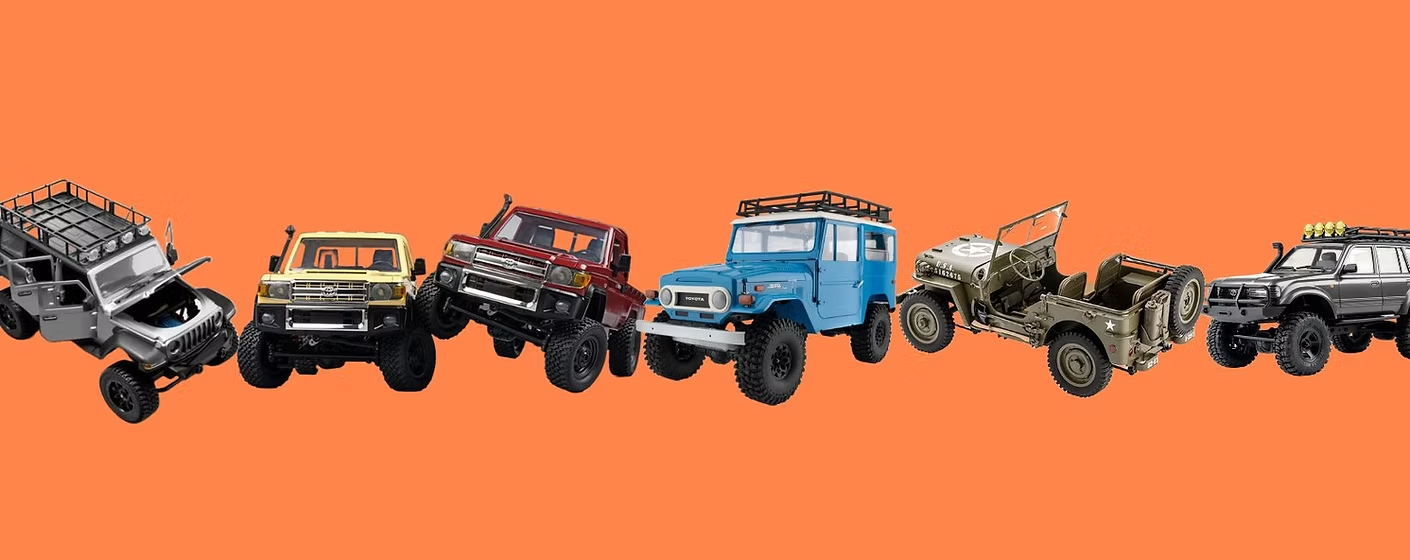Introduction to RC Cars in India
Remote control (RC) cars have seen a remarkable ascent in popularity across India, morphing from a niche interest into a mainstream hobby that captivates enthusiasts of all ages. This shift can be attributed to several factors, including increased accessibility to advanced technology, a burgeoning online marketplace, and an expanding community of hobbyists and professionals alike. The interest in RC cars, once limited to a handful of aficionados, has now permeated various segments of society, attracting children, teenagers, and even adults who seek both entertainment and competition.
The emergence of RC cars in India dates back a few decades, primarily appealing to hobbyists who would meticulously build and customize their vehicles. Over time, advancements in technology have introduced a variety of models, features, and functionalities that cater to diverse preferences. With the introduction of electric and nitro-powered cars, as well as scaling options that range from 1/12 to 1/5, the hobby has become more dynamic. Furthermore, the rise of online retailers has made it easier for consumers to obtain both entry-level and high-end RC kits, fostering a larger consumer base.
Social media platforms and online forums have played a critical role in nurturing the RC car community, allowing enthusiasts to share tips, race experiences, and modifications. Events and competitions, both local and national, have also proliferated, adding a competitive edge to the hobby. As a result, participation rates have increased significantly, with manufacturers and retailers reporting growing sales and interest in RC products. Today, the RC car landscape in India is thriving, marked by a diverse range of products and a vibrant community that continually fosters growth and innovation within this captivating sector.
Current Trends in RC Cars
The landscape of remote control (RC) cars in India is evolving at an impressive pace, characterized by a variety of trends shaping consumer preferences and industry innovations. One of the most evident trends is the increasing popularity of specific types of RC cars, notably off-road, on-road, and rock crawlers. Off-road models, known for their rugged durability and ability to navigate challenging terrains, have garnered a passionate following among enthusiasts. On-road variants, celebrated for their speed and agility on smooth surfaces, attract those who prioritize performance and racing. Meanwhile, rock crawlers are gaining traction, catering to hobbyists interested in traversing obstacles and challenging landscapes with precision.
Another noteworthy trend is the rise of electric-powered RC cars, which have gradually supplanted traditional nitro-powered models in popularity. Electric models offer several advantages, including lower maintenance costs, quieter operations, and ease of use, making them increasingly accessible to a broader demographic. Furthermore, advancements in battery technology have significantly extended run times, allowing for longer and more enjoyable driving sessions.
The customization of RC cars is also experiencing a surge, with hobbyists keen to personalize their vehicles for enhanced aesthetic appeal and performance. Many manufacturers now produce a range of aftermarket parts, enabling users to modify their cars according to individual taste and driving style. This trend towards customization highlights the growing community of RC enthusiasts in India who engage in sharing tips, tricks, and modifications online, creating a collaborative culture around the hobby.
Technological advancements play an essential role in enhancing the driving experience of RC cars. From improved radio control systems to sophisticated telemetry options that provide real-time performance data, the incorporation of technology is making remote control vehicles more intuitive and user-friendly. These iterations reflect the market’s shifting dynamics, catering to both seasoned veterans and newcomers alike.
Impact of E-commerce on RC Car Sales
The rise of e-commerce has significantly transformed the landscape of remote control (RC) car sales in India, offering consumers unprecedented access to a diverse array of models. With the proliferation of online platforms, hobbyists and newcomers alike can explore a vast selection of RC cars that were once challenging to find in local stores. The convenience of browsing through extensive inventories from the comfort of one’s home has made it easier for enthusiasts to discover rare models, elaborate on their interests, and make informed decisions based on availability.
Moreover, online shopping provides a seamless experience that caters to the fast-paced lifestyles of consumers today. Shoppers can easily compare prices, specifications, and customer feedback across various e-commerce websites, ensuring they make well-informed choices before purchasing their desired RC car. This advantage highlights the ability of e-commerce to break down geographical barriers, enabling consumers in even the most remote areas to access premium products that were previously unavailable. As a result, even niche brands can find their market through specialized online retailers, expanding their customer base significantly.
The influence of customer reviews cannot be overstated in this evolving purchasing landscape. Reviews and ratings from previous buyers play an essential role in shaping the perceptions and purchasing decisions of potential customers. This organic feedback mechanism fosters trust and transparency, ensuring that buyers are well-informed about product quality and performance. The prominence of social media and online forums further enhances this aspect, allowing enthusiasts to share their experiences and participate in community discussions, thereby enriching the overall consumer experience in the realm of RC cars.
In conclusion, the e-commerce boom has significantly impacted how consumers in India approach the purchase of RC cars. By providing greater accessibility to a wide range of models, improving convenience, and enabling informed purchase decisions through customer reviews, online sales have undoubtedly shaped the future of remote control vehicles in the country.
Community and Social Media Influence
The growth of remote control (RC) car culture in India has been significantly bolstered by the advent of online communities and social media platforms. As enthusiasts increasingly seek to connect with like-minded individuals, forums dedicated to RC cars have emerged as crucial hubs for knowledge sharing. These online spaces allow hobbyists to discuss various aspects of RC vehicles, from technical specifications to tips on enhancing performance. Additionally, they facilitate collaboration among users, creating a supportive environment for beginners and seasoned RC car enthusiasts alike.
YouTube has also played a pivotal role in popularizing RC cars in India. Countless channels offer detailed reviews, tutorials, and live demonstrations, engaging viewers and building a sense of community. Videos showcasing RC car races or custom builds attract significant viewership, inspiring many to delve deeper into the hobby. This visual medium not only serves as an educational tool but also fosters a shared passion among fans who can comment, ask questions, and form connections based on their interests.
Instagram contributes to the burgeoning RC car community by providing a visual platform for posts that highlight the creativity and personal expression of enthusiasts. The use of hashtags related to RC cars enables users to discover a plethora of content, from eye-catching photographs of custom builds to action shots captured during races. Influencer partnerships on this platform have further amplified the reach of the RC car culture, encouraging new entrants to explore the hobby. Influencers often demonstrate the capabilities of various models, creating excitement and inspiring fans to invest in their own RC vehicles.
Ultimately, social media and online forums are essential to the ongoing development of RC car culture in India. By fostering an inclusive community, these platforms enhance engagement and create opportunities for enthusiasts to learn, share, and collaborate. This interconnectedness is vital for the growth of this exciting hobby and ensures the continued enthusiasm of its supporters.
Technological Advancements Shaping the Future
The remote control vehicle industry is experiencing a transformative phase driven by remarkable technological advancements. One of the pivotal innovations reshaping the landscape is the integration of GPS technology into RC cars. By incorporating GPS, users can now track the location of their vehicles in real-time, enhancing the overall experience. This functionality not only improves usability for hobbyists but also opens new avenues for competitive racing and off-road adventures.
In addition to GPS integration, mobile app control is revolutionizing how enthusiasts interact with their remote-controlled cars. Manufacturers are increasingly developing applications compatible with smartphones and tablets, allowing users to control their vehicles through intuitive interfaces. This development empowers users to adjust settings, monitor performance metrics, and share experiences with fellow enthusiasts via social media platforms, thus fostering a sense of community. The transition from traditional remote controls to smartphone-controlled applications indicates a significant shift in consumer preferences, aligning with modern technological trends.
Another key development in the industry is the enhancement of battery technology, which is critical for improving performance and longevity. Innovations in lithium-polymer battery design have allowed for longer runtimes and quicker recharging, significantly enhancing user satisfaction. The ability to enjoy extended playtime without frequent interruptions is a game-changer, particularly for competitive events. Battery life improvements not only fuel the excitement of racing but also increase the overall reliability of RC cars.
These technological innovations—GPS integration, mobile app controls, and advanced battery life—are paving the way for future models to provide richer and more engaging user experiences. As these advancements continue to evolve, they promise to attract a broader audience, ensuring that remote control vehicles remain a vibrant and dynamic segment of the hobbyist market in India.
Challenges Facing the RC Car Market
The remote control (RC) car market in India is experiencing a wave of enthusiasm among hobbyists and potential buyers; however, several challenges are hindering its growth trajectory. One of the most significant obstacles that the RC car market encounters is the high import duty imposed on foreign products. Many high-quality RC cars are manufactured overseas, and the elevated import duties inflate the retail prices, making them less accessible to the average consumer. Consequently, this discourages potential buyers who might be interested in entering the hobby.
Further complicating the market landscape is the lack of local manufacturing capabilities. The absence of indigenous production facilities results in an over-reliance on imports. This gap not only increases costs but also makes it difficult for local businesses to compete against imported models. In addition, the scarcity of locally manufactured parts and accessories limits customization and repair options for enthusiasts, thereby affecting overall consumer satisfaction.
Moreover, the RC car market in India faces intense competition from lower-priced alternatives, which often do not meet the quality standards of premium models. Many budget-conscious consumers may opt for cheaper, subpar products, resulting in limited growth for reputable brands that offer higher-quality vehicles. This scenario can further impede the establishment of a strong and loyal customer base committed to investing in quality RC cars.
Lastly, the lack of better infrastructure for hobbyists, including parks and tracks specifically designed for remote control vehicles, hampers community engagement. Enthusiasts often rely on improvised spaces, which can detract from the overall experience of participating in the hobby. A dedicated infrastructure would not only enable enthusiasts to fully enjoy their passion but could also attract new participants into the RC car community.
The Role of Competitive Racing Events
Competitive racing events have emerged as a pivotal factor in elevating the popularity of remote control (RC) cars in India. These events serve not only as platforms for showcasing advanced driving skills and cutting-edge vehicle technology but also as a means of fostering a vibrant community among enthusiasts. The adrenaline rush and excitement associated with racing have catalyzed the growth of this hobby, attracting participants and spectators alike.
In recent years, numerous tournaments organized by local clubs and national associations have taken place across the country. These competitions range from casual weekend races to more structured events with specific rules, regulations, and categories, catering to a variety of RC vehicles, including off-road trucks, drift cars, and touring models. The presence of such events encourages both seasoned racers and newcomers to engage in the hobby, thus broadening the participant base and nurturing a sense of camaraderie among individuals with shared interests.
Additionally, competitive racing events have positively impacted the market visibility of RC cars. Sponsors often capitalize on these gatherings to promote their products and services, introducing participants to the latest models and accessories. This heightened exposure not only benefits manufacturers but also helps create a reciprocal relationship between businesses and hobbyists. The influx of new racers leads to increased interest in purchasing RC vehicles and supplies, ultimately contributing to the overall growth of the industry.
These tournaments also provide a structured environment for enthusiasts to learn from one another and share insights regarding vehicle setup, driving techniques, and racing strategies. The collaborative nature of the events enables participants to develop their skills and encourages aspiring racers to take the plunge into competitive racing. Effectively, such events play a crucial role in transitioning RC cars from a niche hobby to a recognized community activity, thereby enhancing their appeal across the nation.
Sustainability and Eco-Friendly Trends
The remote control vehicle industry in India is witnessing a significant transformation driven by an increasing demand for sustainability and eco-friendly options. As environmental concerns become a priority across various sectors, manufacturers of RC cars are adapting by integrating recyclable materials into their designs. This shift not only addresses the concerns of environmentally conscious consumers but also helps establish a more sustainable production process.
The push towards sustainability has led to the implementation of innovative manufacturing techniques that emphasize the use of biodegradable and recyclable components in RC cars. By incorporating such materials, the carbon footprint associated with the production and disposal of these vehicles is notably reduced. Furthermore, by choosing materials that can be easily recycled or repurposed, manufacturers are also contributing to a circular economy, which aims to minimize waste and promote resource conservation.
Another key trend in the RC car market is the rising popularity of electric models. These vehicles offer a cleaner alternative to traditional petrol or gas-powered RC cars, aligning with the global movement towards electrification. Electric RC cars produce lower emissions and provide quieter operation, making them more suitable for urban environments. As the demand for these eco-friendly models continues to grow, manufacturers are leveraging advancements in battery technology, leading to improved performance and longer run times.
Additionally, consumers are increasingly inclined to purchase RC cars that are designed with sustainability in mind. This trend is reflective of a broader societal shift towards conscious consumerism, where buyers prioritize products that align with their values. As such, the RC car industry is progressively embracing eco-friendly trends to enhance its market appeal, ensuring that it remains relevant in an evolving landscape that prioritizes environmental responsibility.
Conclusion: The Future of RC Cars in India
As we reflect on the evolving landscape of remote control cars in India, it becomes evident that the future holds a plethora of opportunities for both enthusiasts and manufacturers. The rising interest in RC cars can be attributed to several factors, including advancements in technology, increased accessibility to quality products, and a growing community of hobbyists. Emerging innovations like electric-powered models, improved battery life, and advanced control mechanisms are likely to attract new participants to this exciting hobby.
Additionally, the potential for off-road and on-road vehicle versatility will continue to drive growth within the industry. As consumers increasingly seek out more realistic and high-performance options, manufacturers will respond by enhancing features and introducing specialized models tailored for specific terrains. This trend not only caters to seasoned enthusiasts but also piques the interest of newcomers eager to explore the capabilities of modern remote control vehicles.
The rise of online communities and forums dedicated to RC cars in India signifies an encouraging shift towards collaboration and knowledge sharing among enthusiasts. This social aspect is crucial in sustaining interest and support for the hobby, as individuals share experiences, tips, and modifications. Additionally, the increasing prevalence of RC car events and competitions can help solidify a competitive landscape, inspiring hobbyists to hone their skills and showcase their creativity.
In a broader context, the changing consumer behavior and the push for sustainable practices may also influence the future of RC cars in India. As concerns regarding the environment grow, manufacturers will likely explore greener alternatives in their products, potentially incorporating recyclable materials and energy-efficient technologies.
In summary, the future of RC cars in India appears bright, fueled by innovation, community involvement, and a growing consumer base. As the industry evolves, enthusiasts will find new avenues to engage with this thrilling hobby, ensuring its continued relevance in the years to come.





